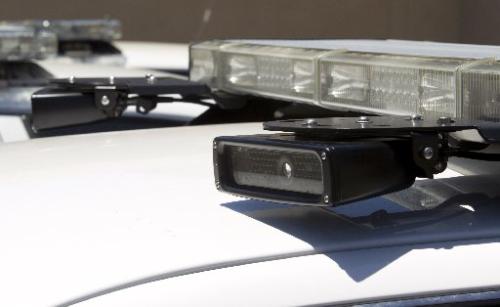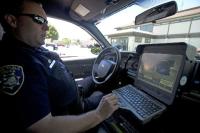| |
Richmond joins ranks of departments using sophisticated cameras to nab car thieves
By Joaquin Palomino and Robert Rogers
Contra Costa Times
Posted: 10/29/2013 11:15:08 AM PDT | Updated: 104 min. ago

The readers for the automated license plate reader (ALPR) are mounted on a police cruiser in San Pablo, Calif., photographed Thursday, June 20, 2013. (D. Ross Cameron/Bay Area News Group)
RICHMOND -- Drive through this city enough, and your car will be cataloged in the Richmond Police Department's sprawling database.
Police photograph around 44,000 license plates every day, a rate at which they expect will yield more than 16 million photos stockpiled by 2014.
Why the huge data-collection operation? To reduce auto theft and recover stolen vehicles, police say, a problem so severe that it demands a new approach to combat it.
"(Auto theft) is a regional problem of epidemic proportions," said Richmond police Capt. Mark Gagan.
Five Bay Area cities last year were among the top 10 nationally in auto thefts per capita, according to FBI data, with Richmond ranking worst among cities with

San Pablo, Calif. patrolman Dave Hoff uses his cruiser's automated license plate reader (ALPR) to watch for stolen vehicles as he drives around his beat, Thursday, June 20, 2013. (D. Ross Cameron/Bay Area News Group)
at least 100,000 residents, securing the dubious title of car theft capital of the nation in 2012.
While violent crime has trended down in the city for years and police staffing levels are higher than most Bay Area cities, auto thefts rose 38 percent last year, to 1,866. Those numbers mark an improvement over five years ago, when the city's auto thefts crested over 2,300 and placed second to Oakland nationally.
To help stem the tide, last May the department bought four high-tech License Plate Reader cameras that are attached to the front of patrol vehicles and can photograph and store roughly eight plates per minute.
When a stolen car is scanned, police are alerted. The readers were first deployed by neighboring San Pablo, where police officials raved about their performance in helping crack down on car thefts.
"It lets officers do what they would normally be doing on patrol but much more efficiently," said Richmond police Capt. Anthony Williams.
Officer Mark Hall, who specializes in nabbing car thieves, said last year's spike was linked to a confluence of factors, including persistent economic malaise and the emergence of local "chop shops" willing to pay for hot cars.
Burglars and robbers like to steal cars, use them to commit other crimes and then dump them.
Police say the readers, which cost $90,000, are already paying dividends. In March, the readers helped the department find 16 stolen vehicles and make one arrest. Operations are conducted monthly, and result in arrests and recoveries, Gagan said.
Car thefts are down 23 percent from last year, according to police statistics.
While the police praise the technology, it draws opposition from civil liberties advocates who complain it jeopardizes privacy.
"The data is a temptation," said Chris Conley, a technology attorney with the American Civil Liberties Union. "All sorts of sensitive and personal information is being collected, and there is no such thing as a perfect security system."
License Plate Readers are just one of many crime-fighting gadgets Richmond police have bought and deployed in recent years. The department has ShotSpotter -- which uses sophisticated audio-detection technology to triangulate the exact location of gunshots -- and closed-circuit TV cameras scattered throughout the city.
While department officials credit the new tools for helping drive down crimes, they acknowledge the difficult balancing act between safety, freedom and privacy.
"People think that it's very 'big brother,'" Gagan said. "And I understand that, but I believe that in order to be effective and progressive in police work, you have to keep current on technology."
Ellen Seskin, a 29-year resident who has been skeptical of the department in the past, said she is comfortable with the surveillance technology in part because she trusts the current police regime.
"I've gotten to know some of the officers and I've gotten to know the chief (Chris Magnus), and everyone I've met from the force has been very straightforward, honest and fair," Seskin said. "It really depends on whose hand (the technology is) in."
To address community concerns, the city's Police Commission will hold a public meeting about the License Plate Readers beginning at 5 p.m. Tuesday in the Richmond Room at City Hall.
Police say they will retain the data for at least one year and share it with the Contra Costa Sheriff's Office and the Sacramento Sheriff's Office, both of which regularly recover stolen vehicles from Richmond.
Richmond police leaders said they will not store photos from License Plate Readers in controversial shared databases, called "fusion centers," that allow scores of police agencies to share information.
This article was produced in collaboration with RichmondConfidential.org, a nonprofit news service based in the UC Berkeley Graduate School of Journalism. Contact Robert Rogers at 510-262-2726 or rrogers@bayareanewsgroup.com.
|
|

